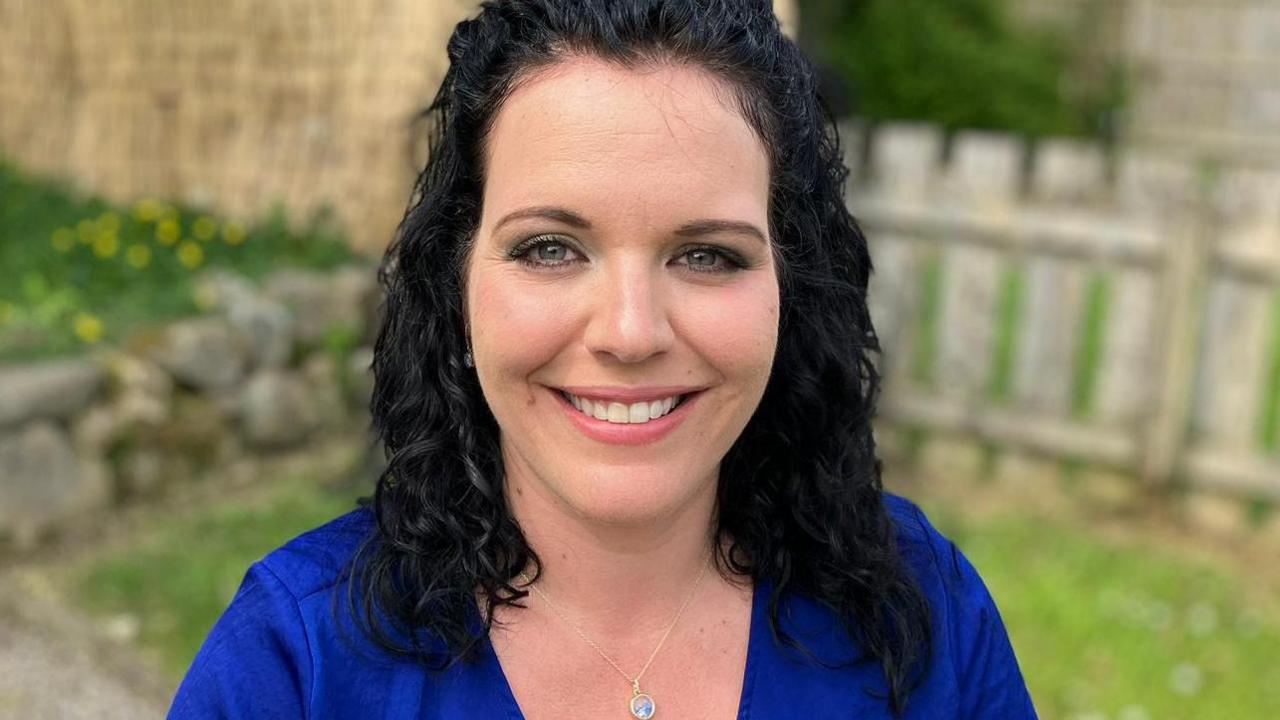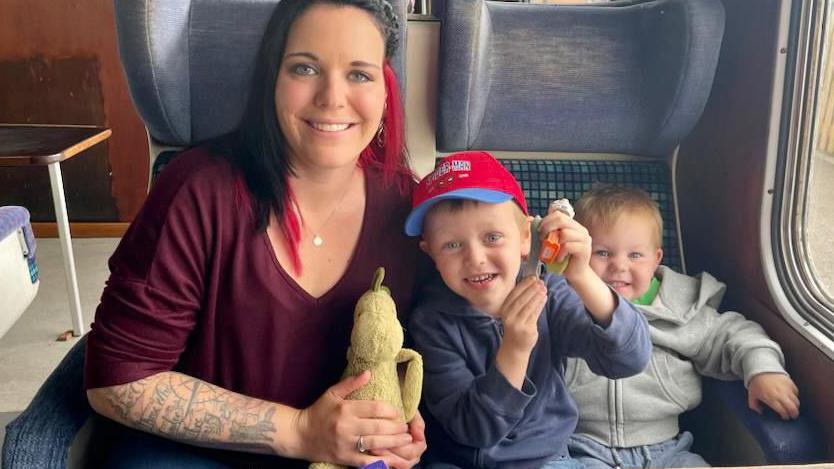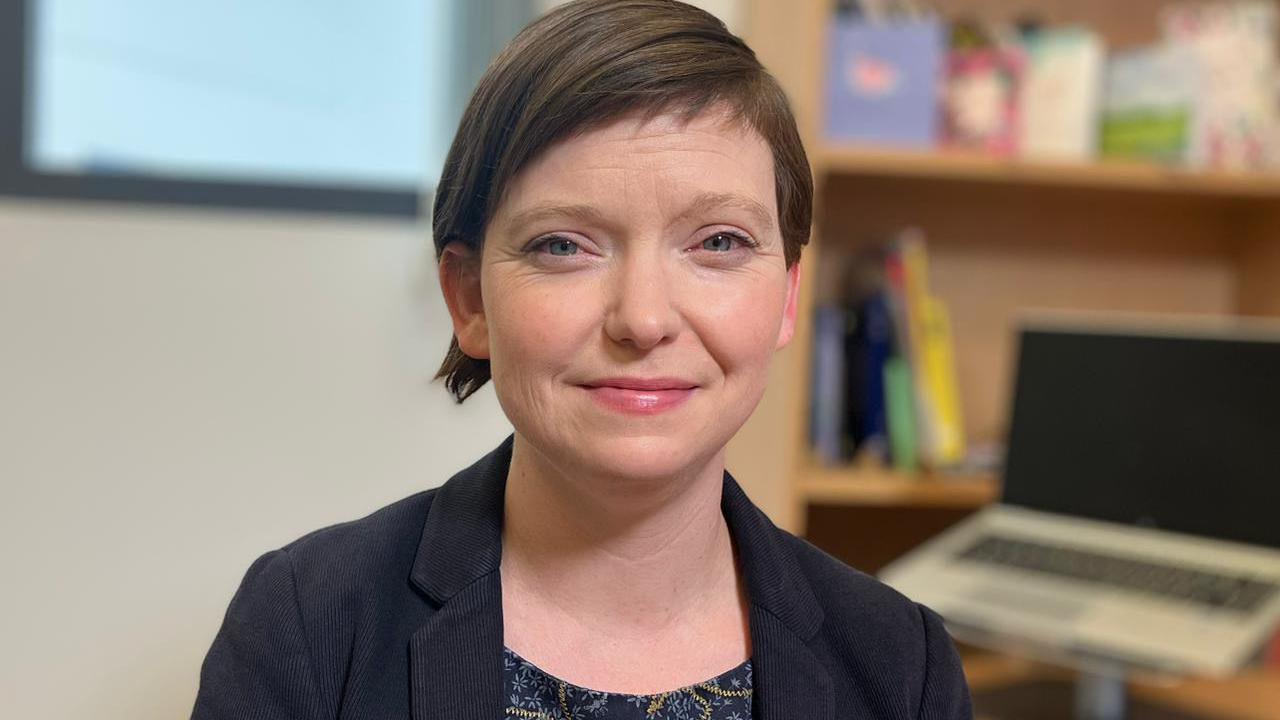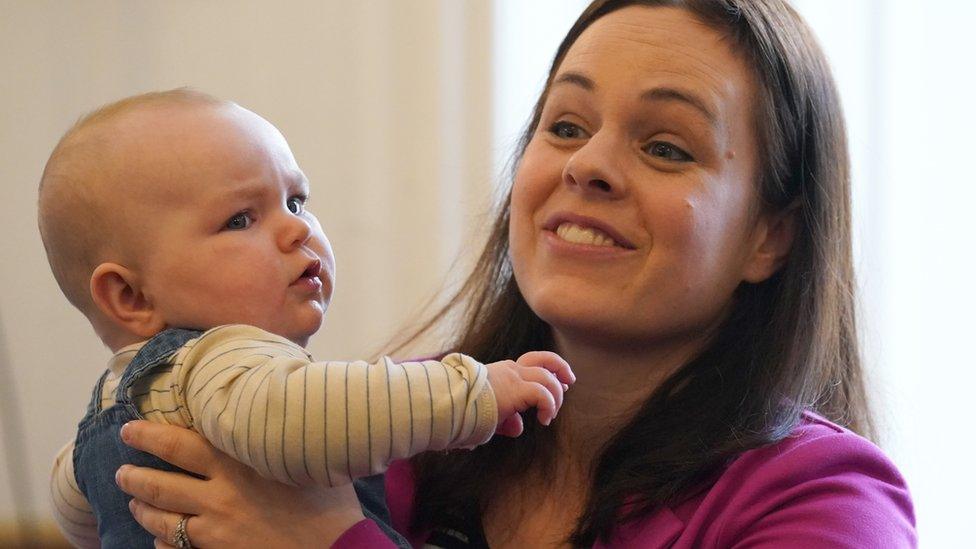I feared losing my children over postnatal depression

Hope experienced severe postnatal depression after giving birth to her second child
- Published
About one in five women develop mental health issues during and after pregnancy but many say they fear reaching out for help because of the stigma.
Hope Cawood experienced severe postnatal depression after giving birth to her second child during lockdown.
The 34-year-old from Aberdeen, told the BBC she feared that seeking help would result in her losing custody of her children.
“I thought if I told my midwife what I was feeling and what I was doing, they were going to take my babies away from me,” she said.

Hope sought help from a psychiatrist who diagnosed her with PTSD, depression and anxiety
Suicide is the leading cause of death for new mothers during the first year after giving birth.
Hope experienced mental health issues after both her pregnancies which left her struggling to bond with her children.
She said the problems began after an extremely traumatic birth for her first son.
Complications with the birth left doctors concerned that she might die and Hope was unable to meet her baby for three days.
She was later diagnosed with post-traumatic stress disorder (PTSD), depression and anxiety.
Although there were no complications with her second pregnancy, she plummeted into a deep depression after giving birth, which lasted a year.
'Dark thoughts'
“I felt like I was drowning and there was no way to get back up,” she said.
“The deep, dark thoughts kept happening and I wasn’t bonding with him and I couldn’t figure out why.
“I dreaded going to bed at night and having to do it all again in the morning, and I didn’t understand why I felt so sad when I had such a beautiful baby."
Hope said there were times that when she was screaming in her baby’s face, asking what he wanted from her.
“I just broke down, and said I’m not a good mum, and my babies are gonna be taken away if I tell anybody these are the feelings I was having,” she said.
Eventually, Hope sought help from a psychiatrist and received cognitive behavioural therapy (CBT) which she says was transformational.
She also accessed support groups where other women shared their stories.
After feeling that things had “finally fallen into place”, Hope is now training to be a counsellor to help other women experiencing what she went through.
“I think there’s still a lot of stigma to break, and I think a lot of people are still afraid to talk about their feelings," she said.
“They feel they’re a bad mum if they admit those things, and I would really like to see more awareness around that but I think we’re heading in the right direction.”
Hope wants women experiencing perinatal mental health issues to know that their feelings are normal and that there is help available.

Dr Selena Gleadow-Ware said many women fear reaching out for help due to stigma
To reflect the increased demand on mental health services and evolving evidence, Scotland’s healthcare watchdog has released the first new guidelines for perinatal mental health in over a decade.
The guidelines, developed by Healthcare Improvement Scotland (HIS), include versions for both patients and healthcare professionals in a bid to improve care and reduce stigma.
Dr Selena Gleadow-Ware, a consultant perinatal psychiatrist and co-chair of the HIS guideline development group, said mental health problems during or after pregnancy are “surprisingly common”.
“We now know there’s a whole range of difficulties that they might experience, I think traditionally people have been much more comfortable talking about post-natal depression.”
She added: “We know that it’s also difficult to reach out for help, and many are worried about coming forward.
"Unfortunately there’s still a lot of stigma and fear that if they open up they will be judged, and perhaps people will think they’re an unfit mother or parent.
“We’re hoping this will help women have access to information and recognise there is support out there and they can get better."
A key development is a new app for patients which lists specific mental health conditions and provides links to information and support, recommendations for planning and what treatment they can expect to receive.
Patients will be able to leave comments and reflections on how they are feeling which a healthcare professional can later access.
The new toolkit also includes information on mental health conditions that previously weren’t covered, including birth trauma and borderline personality disorder.
There is also updated safety advice on the use of medications for mental health during pregnancy and breastfeeding.
Investment in services
A Scottish government spokesperson said ministers are committed to investing in perinatal and infant mental health services.
"In last financial year alone, we invested over £10 million to support health boards in developing high quality statutory specialist services, and increasing third sector provision across Scotland.
“To further support this, we have worked with NHS Education Scotland to support workforce development and roll out a suite of training accessible to all professionals across Scotland.
"This includes the Perinatal Mental Health Curricular Framework which accompanies a range of educational programmes aimed at universal and specialist staff.”
Related topics
- Published20 September 2023
